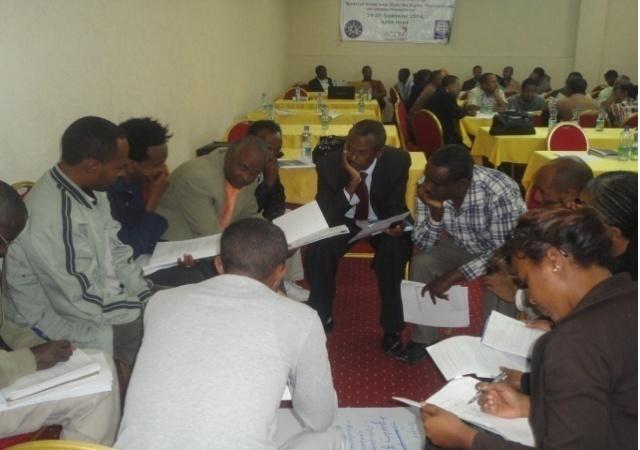How can Ethiopia do better at mitigating disaster risk and adapting to climate change?


Government officials brainstorming about how to improve DRM process
A blog by Manish Kumar, ACCRA Ethiopia Coordinator
Manish Kumar is the newest member of the ACCRA team, which he joined in August 2014 as the Ethiopia National Coordinator. Back from a workshop where national government officials reflected on their experiences of developing early warning systems, disaster risk mitigation, and adaptation plans at Woreda level, he’s sharing with us key recommendations that can help Ethiopia improve its mechanisms to plan for and respond to unexpected weather events.
Participatory and bottom up planning for Disaster Risk Reduction and its integration with development planning and programme has been prioritised as one of the important principles in Ethiopia’s recently approved national Disaster Risk Management (DRM) policy.
Disaster Risk Management Food Security Sector (DRMFSS), Ministry of Agriculture as the focal ministry on DRM has initiated a process of developing Woreda (district) Disaster Risk Mitigation, Adaptation and Contingency planning based on Woreda Disaster Risk Profile. So far close to 50 (out of more than 700) Woreda have completed this exercise with technical and financial support of DRMFSS and its various development partners including ACCRA. Preparing these plans undoubtedly is an important step, however real participation of vulnerable community in planning process and the implementation of these plans still remains a big challenge.
ACCRA in collaboration with DRMFSS recently organised a two days national level experience sharing and review workshop. More than 50 participants’ primarily relevant experts from Woreda, region and federal government attended. During the workshop, participants thoroughly reviewed and brainstormed the existing Disaster Risk Mitigation, Adaptation (DRM & A) and Contingency Planning (CP) process and came up with various suggestions / recommendations on how to improve the current planning process and implementation of these plans in line with recently approved Ethiopia’s National Policy and Strategy on DRM as follows:
Integration of risk mitigation/adaptation plan with the existing development programmes of government and I/NGOs programmes
- DRMFSS should coordinate with concerned ministries including national planning commission to influence risk informed plans, monitoring and reporting process and advocate for more significant funding allocation towards Woreda contingency planning
- INGOs to include risk reduction actions as planned in the existing Disaster Risk Mitigation, Adaptation (DRM & A) and Contingency Planning (CP) documents right from the stages of conducting needs assessments and drawing up programme MoUs
- The national governing body for CSOs can include mandate on DRR integration into all the development and humanitarian programme of NGOs project in their regulatory guideline.
- DRMFSS should take lead to provide capacity building support to line ministries at all levels for the integration of DRR into annual development planning. In addition, DRMFSS should ensure availability of Woreda DRM & A and CP with all the sector offices in respective Woreda for ready reference.
Promote community participation, ownership and leadership to develop and implement the national planning process for disaster risk management, adaptation and contingency planning
- ‘Development agents’(in addition to kebele chairpersons) should be appointed to participate in planning workshops at woreda level as they are from the local community and closely work with them.
- When Woreda administration with support of DRMFSS undertaking Woreda level DRM/A and CP, they should consider Kebele level DRR and contingency plans developed by I/NGOs and UN organisations operational in those Woreda.
- DRMFSS (in charge of endorsing DRM & A and CP) to ‘socialise’ these plans with all development actors at the Woreda level i.e designing posters and translate them into local languages. This material, along with the DRM & A and CP itself should be shared and discussed with heads of all the lines offices, Kebele chairpersons, selected DAs and I/NGOs operational in the Woreda to facilitate their respective community to lead and implement as many actions as possible through their own resources.
(0) Comments
There is no content